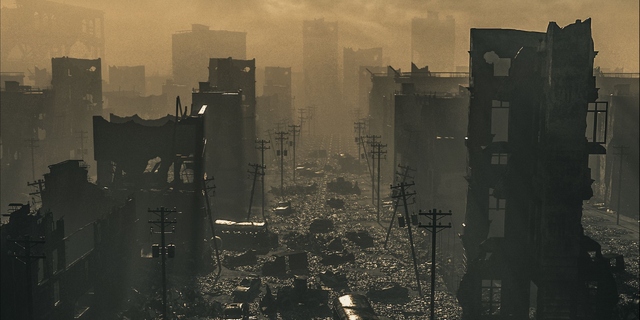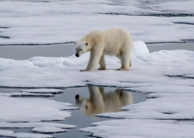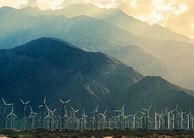|
Climate Change (tagged articles)
The keyword Climate Change is tagged in the following 43 articles.
2022, Vol. 14 No. 09
This interdisciplinary paper investigates the shortfalls and obstacles to success currently facing the climate movement, examining issues represented by the disconnect between policy and electoral politics, the hypocrisy and blatant indifference... Read Article »
2021, Vol. 13 No. 09
This research lies at the nexus of political communication theory relating to emotional affect and political processing and the burgeoning field of sentiment analysis. News coverage can affect opinion both through the information it provides and... Read Article »
2021, Vol. 13 No. 09
After thousands of years of innovation, humankind has shaped the modern world into a new planetary epoch: the Anthropocene. This paper connects the human propensity to carve our comfortable, convenient civilizations into our local environments with... Read Article »
2021, Vol. 13 No. 01
This paper examines the intricacies of factory farming by analyzing its social, political, economic, and environmental impacts in an age of capitalist consumption. Factory farming has become a pervasive institution with which most Americans engage... Read Article »
2019, Vol. 11 No. 02
In recent years, Climate Change has been increasingly framed as a security issue, with some theorists going so far as to call it the most important security issue of the 21st century. This paper will examine the relationship between Climate Change... Read Article »
2017, Vol. 9 No. 12
Climate Change is already altering our biosphere and is projected to bring about monumental changes to our planet’s environment, changes which are unprecedented in human history. Numerous social groups have drawn upon a wide assortment of... Read Article »
2017, Vol. 9 No. 12
In 2010, over 250,000 Syrian farmers were forced from their land due to water shortages. Lack of water left these farmers dangerously food insecure, so they moved, en masse, into Syrian urban centers. This strained an already overburdened infrastructure... Read Article »
2017, Vol. 9 No. 05
Is it possible to objectively define the Anthropocene? This essay argues that whether or not it is precisely definable as a geological epoch, its true value, as a concept grounded in futurity, lies within the social realm. The origins of the term... Read Article »
2017, Vol. 10 No. 2
In December 1948, the United Nations adopted the Universal Declaration of Human Rights, which recognized the universal human right to food. Most recently in July 2010, the U.N. General Assembly adopted resolution 64/292 that recognized the human... Read Article »
2017, Vol. 9 No. 03
In Gallup’s 2016 environment poll, 64 percent of U.S. adults are now worried a “great deal” or “fair amount” about global warming, with a record 65 percent attributing warming primarily to human activities (1). These... Read Article »
2017, Vol. 9 No. 03
Through increased industry practices, land degradation, and burning of fossil fuels the anthropogenic sources of CO2 have increased creating global concern due to the adverse impacts of Climate Change. Carbon dioxide capture and storage (CCS) technologies... Read Article »
2016, Vol. 8 No. 12
Biochar is biomass that has been converted into charcoal through the pyrolysis process. Biochar is applied into soils for carbon sequestration or for improving soil fertility. The carbon bonds in biochar are very stable and do not break down easily... Read Article »
2016, Vol. 6 No. 1
Sweden, a small country with almost 10 million inhabitants, is the world's most sustainable country according to some reports that compare environmental, social, and governance components between nations. Sweden plays a significant role in the European... Read Article »
2016, Vol. 6 No. 1
Climate Change and the myriad of challenges that come with it are a reality the entire world must face. However, for Canadian province, Alberta, the stakes are especially high. Oil and gas mining made up 18.3% of Alberta's GDP in 2015 and therefore... Read Article »
2016, Vol. 6 No. 1
In today's globalized world, international cooperation and information sharing becomes increasingly important. This paper examines the criteria provided in the United State's Endangered Species Act, the European Union's Habitat Directive, and the... Read Article »
2016, Vol. 6 No. 1
Whenever a decision is made in a social, political, or economic context, it is implicitly grounded in an ethical outlook. But where do these outlooks come from? To investigate this query, I examine the basis for ethical decisions regarding technology... Read Article »
2016, Vol. 6 No. 1
Despite all the information we have regarding Climate Change and the potential perils of continuing on our path of consumption, people are slow to make the necessary changes. Our tendency to live habitually and the dampening effect continuous negative... Read Article »
2015, Vol. 5 No. 1
The number of species becoming extinct has drawn a significant deal of attention from scientists and non-scientists alike. This research reviews recent literature citing evidence for the impact humans have had on our planet and how our biological... Read Article »
2015, Vol. 5 No. 1
Overcoming the threats of the snow leopard with immediate action may be what will save this species from extinction. This report provides a brief overview both of the challenges faced by the snow leopard and the roles local people have taken in... Read Article »
2015, Vol. 7 No. 10
While some believe that scientists should communicate their research apolitically in research journals, others believe that scientists should communicate to the media in order to bring awareness to their research topic. As a compromise to these... Read Article »
2014, Vol. 4 No. 1
What we see is partially dependent on what we are shown. As communicators, we have a duty to inform and educate and lead. As environmental communicators we have the privilege of explaining how the various parts of our natural world work, individually... Read Article »
2014, Vol. 6 No. 11
Environmental concerns have been of increasing salience to Americans since the 1960s, when Rachel Carson published Silent Spring and spurred public anxiety over the use of the widely utilized pesticide DDT. The impact of Carson’s work was... Read Article »
2014, Vol. 8 No. 1
President Grimsson studied economics and political science at the University of Manchester, and in 1970, became the first person in Iceland to earn a PhD in political science. In 1973, he became a Professor of Political Science at the University... Read Article »
2014, Vol. 4 No. 1
The relationship between humans and their environment is a heavily debated, multi-disciplinary discussion that has raised awareness about urgent issues, such as Climate Change. Earth’s booming population encourages globalization, greed, and... Read Article »
2014, Vol. 6 No. 04
The copious amounts of forgotten and disregarded food that are tossed mindlessly into our landfills are a global travesty of massive proportions. Americans alone waste enough food in a day to transform the Rose Bowl, a football stadium capable of... Read Article »
2014, Vol. 1 No. 1
A European single market for electricity is modeled to find the optimal portfolio of energy generation technologies in the presence of a carbon tax. The goal is to find the Pareto optimal carbon tax rate such that both carbon emissions and production... Read Article »
2013, Vol. 3 No. 1
MacGillivray Freeman Films was founded over forty years ago by Greg MacGillivray and the late Jim Freeman. In 2011, the company launched “the world’s largest ocean media campaign, a 10-year global initiative called One World One Ocean... Read Article »
2013, Vol. 3 No. 1
The development of Climate Change action plans and strategies is usually done via the policy cycle during the first half of a government’s term. This short- term political process is at odds with the longer-term Climate Change issue that requires... Read Article »
2013, Vol. 3 No. 2
In an era of accelerated Climate Change, Canadian homeowners face growing financial exposures to environmental risks, and climate-related property damage now represents the largest aggregate cause of losses in the global insurance industry (Mills... Read Article »
2013, Vol. 5 No. 01
Everywhere, everyday we are reminded of the planetary crisis. Ice caps melt, forests are decimated, species go extinct and extreme climatic changes threaten the survival of human civilization. We desperately need a new narrative – a compelling... Read Article »
2012, Vol. 4 No. 08
Nelson Mandela once said, "You can never have an impact on society if you have not changed yourself." This quote is particularly applicable to the field of energy, and the transition from an unsustainable fossil fuel consuming world, to one based... Read Article »
2012, Vol. 4 No. 06
With their long-term orientation, environmental problems present a unique challenge to the system of policymaking in the United States. The question of how to address Climate Change—and in particular, how to mitigate the phenomenon—has... Read Article »
2012, Vol. 4 No. 02
Climate Change negotiations have been on the international stage for almost four decades. They have a complex history, and act as a comprehensive example of the many variables, obstacles, environments, and processes that can affect any international... Read Article »
2011, Vol. 2010/2011 No. 1
The urgency of concern over the earth’s biodiversity has increased over the last couple of decades. This has resulted in the formation of the Convention of Biodiversity which declared in 2002 that it would have achieved a ‘significant... Read Article »
2011, Vol. 2010/2011 No. 1
The territorial claims on the North Pole are the latest contentious grey area amongst world forces – Russia, Canada, the USA, Denmark and Norway. The events could have been the perfect opportunity for a lesson in puppet mastery on the international... Read Article »
2011, Vol. 2010/2011 No. 1
The European Union (EU) is rarely seen as a powerful actor on the international relations stage. A statecentric, ‘high politics’ view of global politics tends to overlook the involvement of the EU and its effectiveness, 2 and the dominance... Read Article »
2011, Vol. 3 No. 01
Big oil’s ruthless supply and demand tactics have monopolized the entire energy industry by shredding competitors’ attempts to offer alternatives. Consumers are thus forced to surrender their right to choose due to the aggressive techniques... Read Article »
2010, Vol. 2 No. 11
We are at war. Yes, I said it. We are at war. We are at war, with ourselves, against ourselves, and by that, I mean we are damaging the very planet that we subsist on. Where will we be without this planet? We are destroying ourselves, bit by bit... Read Article »
2010, Vol. 2 No. 03
In recent years, it has become clear through scientific investigation and public opinion that the current state of environmental degradation and ongoing damage are a practice that cannot be carried into future generations if mankind wishes to maintain... Read Article »
2010, Vol. 2 No. 02
During his Inaugural Address, President Barack Obama resonated with the ideals of many Americans—prosperity, freedom, good will, faith, and determination. He spoke of the market as having "umatched" power, "to generate wealth and expand freedom... Read Article »
2009, Vol. 1 No. 11
Much debate has recently arisen over China’s and India’s responsibilities as related to climate protection. These two countries have repeatedly pleaded that their emissions be judged on a per-capita basis, since their per-capita emissions... Read Article »
2009, Vol. 1 No. 10
Just by flipping through television channels or walking through the aisles of a grocery store, it is easy to see that the popularity of “Green” and “Sustainable” lifestyles is growing everyday. With an impending energy crisis... Read Article »
2007, Vol. 1 No. 1
In Washington as in Peking, in Beirut as in Bamako, the question is asked of us: what is the European Union’s (EU) foreign policy? In Lisbon on October 18th, the 27 member states agreed to a first response on means and tools. With the creation... Read Article »
Expedited Article Review
Submit an article and get a decision fast.
If you need a fast decision, INQUIRIES Journal offers expedited processing of your submission for a small fee. Depending on the expedited review option you choose, you can receive a decision in as few as 5-days.
In addition to a shorter review period, the fee supports the journal's continued operation and open-access publishing model. Standard submissions are always free. Submit Now » - Submit an Article to Inquiries Journal -
|














































